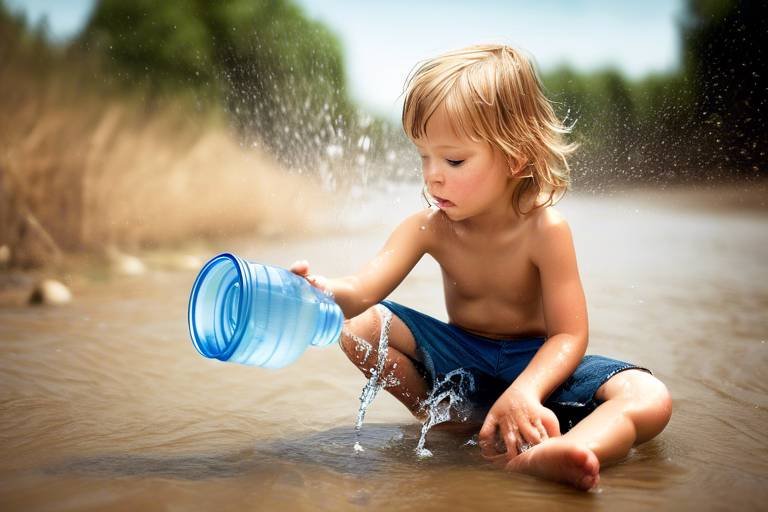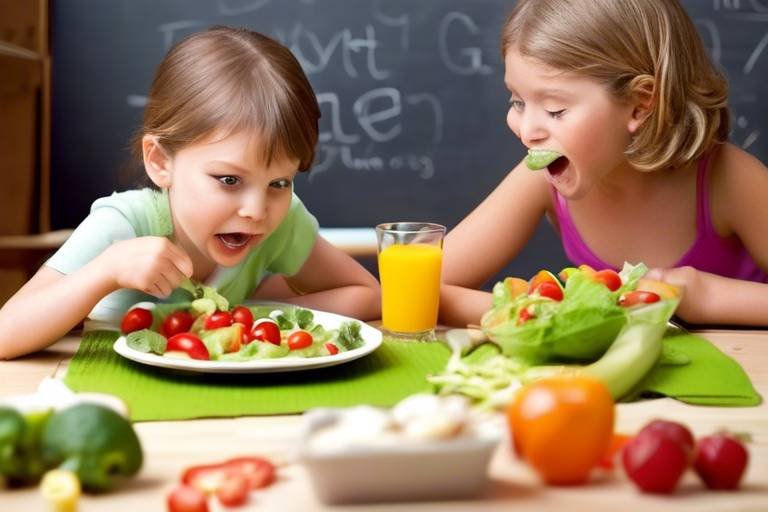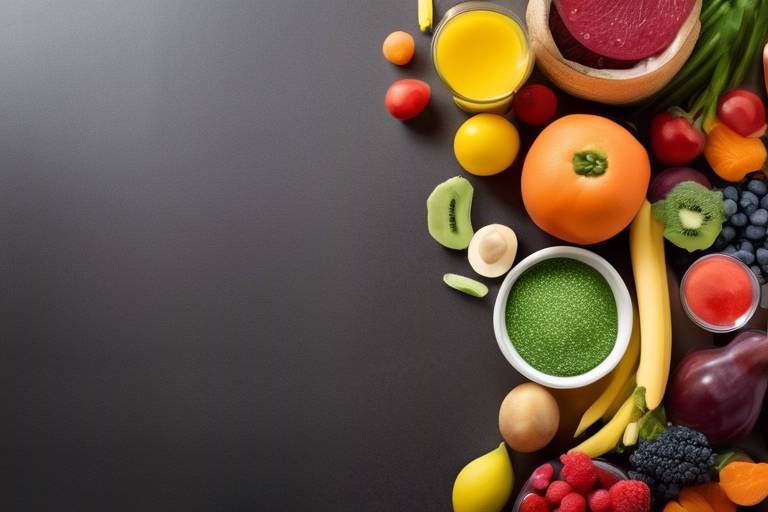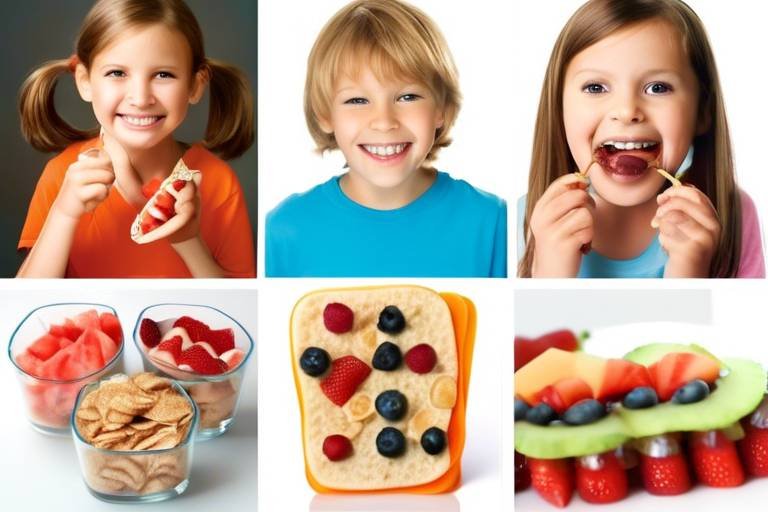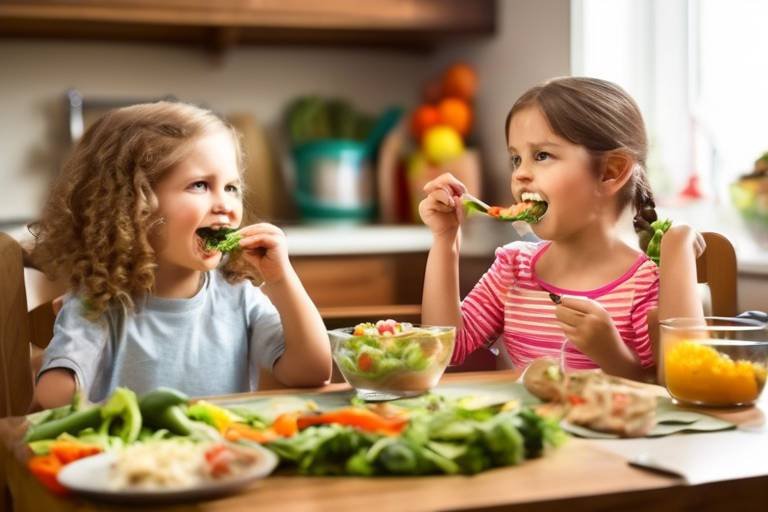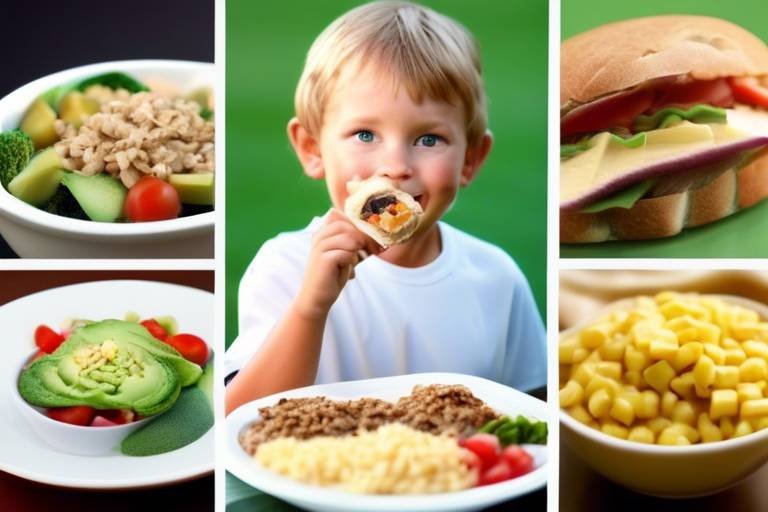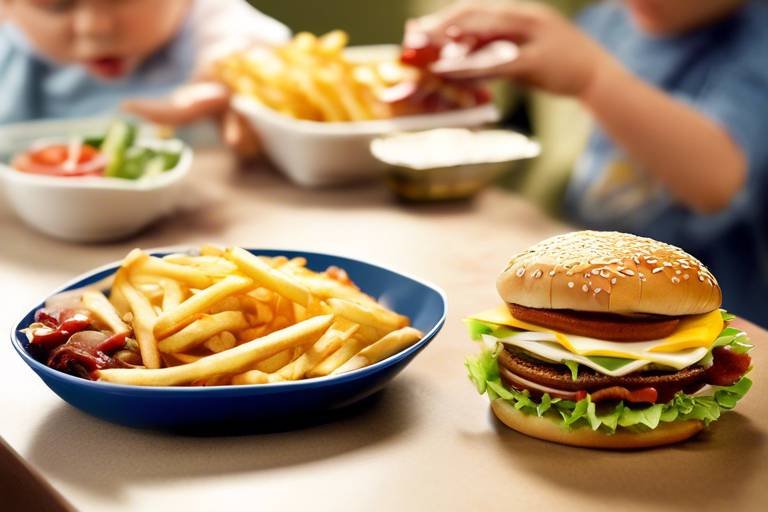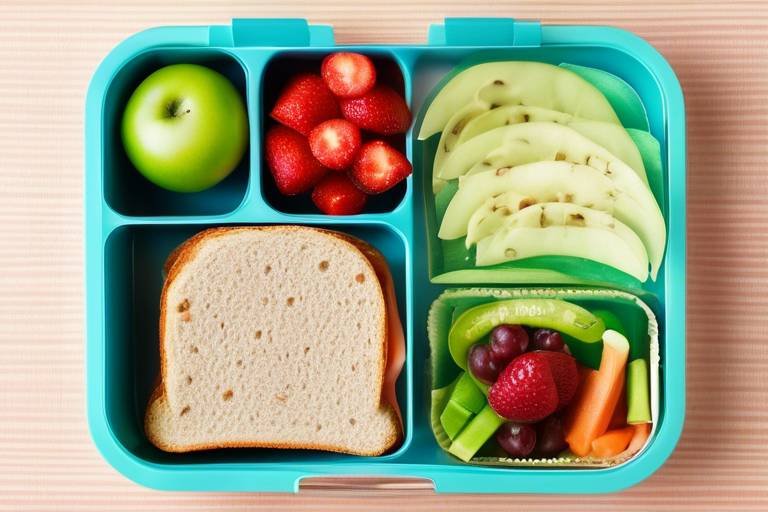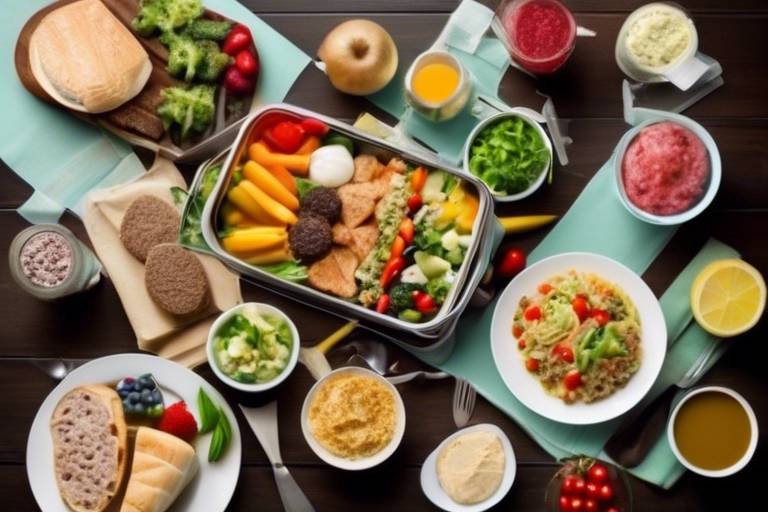Keeping Your Kids Hydrated: The Importance of Water
When it comes to our little ones, hydration is often overlooked, yet it plays a vital role in their overall health and well-being. Water is not just a thirst quencher; it’s the lifeblood of every cell in their bodies. Imagine water as the oil in a well-tuned machine—without it, everything can start to grind to a halt. Kids are constantly on the move, exploring, playing, and learning, which means they need a steady supply of water to keep their engines running smoothly.
Hydration is especially crucial for children because their bodies are still developing. Water aids in digestion, nutrient absorption, and even helps maintain a healthy body temperature. Think of it as the secret ingredient in their daily recipe for growth and development. Moreover, adequate hydration can significantly impact cognitive functions—yes, that’s right! A well-hydrated child is likely to concentrate better in school, have improved memory, and be less prone to mood swings. Isn’t it amazing how something as simple as water can affect so many aspects of a child’s life?
So, how can parents ensure their kids are drinking enough? It’s all about making hydration a fun and integral part of their day. Whether it’s through creative water presentations or incorporating water-rich foods, there are countless ways to keep those little bodies hydrated. In the following sections, we will delve deeper into the role of water in child development, signs of dehydration, and practical tips for encouraging healthy hydration habits.
Water is essential for children's physical and cognitive development, impacting everything from digestion to concentration. Understanding its role can help parents prioritize hydration in their daily routines.
Recognizing the early signs of dehydration is crucial for parents. Symptoms can range from mild to severe, and knowing what to look for can prevent serious health issues.
Children may exhibit various physical symptoms when dehydrated, including dry mouth, fatigue, and decreased urine output. Awareness of these signs can prompt timely intervention.
Dehydration can also lead to irritability and decreased focus in children. Understanding these behavioral changes helps parents address hydration proactively.
Chronic dehydration can have long-term effects on a child's health, including impaired growth and development. Early intervention is key to preventing these issues.
Different age groups have varying hydration requirements. Understanding these needs can help parents tailor their approach to keeping their children well-hydrated.
While water is the best source for hydration, various foods and beverages can also contribute. Parents should be aware of these options to encourage healthy habits.
Incorporating fruits and vegetables with high water content can enhance hydration. Choices like cucumbers, watermelon, and oranges are not only nutritious but also enjoyable for kids.
Besides water, there are healthy beverage alternatives that can keep kids hydrated. Options like milk and natural fruit juices can provide hydration along with essential nutrients.
Getting kids to drink enough water can be a challenge. Implementing fun strategies can make hydration appealing and part of their daily routine.
Colorful and fun water bottles can motivate children to drink more. Personalizing their containers can create a sense of ownership and encourage regular hydration.
Making water a part of meals and snacks can increase overall intake. Serving water alongside meals or offering water-rich snacks can promote better hydration habits.
Q: How much water should my child drink daily?
A: The general recommendation is about 5-7 cups of water a day for children, but this can vary based on age, activity level, and climate.
Q: What are the signs that my child is dehydrated?
A: Common signs include dry mouth, fatigue, dark urine, and irritability. If you notice these symptoms, encourage your child to drink more fluids.
Q: Can my child get enough hydration from food?
A: Yes! Many fruits and vegetables have high water content and can contribute to your child’s daily hydration needs.
Q: How can I make water more appealing to my child?
A: Try adding slices of fruit or herbs like mint to water for a fun twist. You can also use colorful straws or fun cups to make drinking water more exciting!

The Role of Water in Child Development
Water plays a crucial role in the development of children, impacting numerous aspects of their health and well-being. From the moment they are born, children rely on water not just for hydration but also for optimal physical and cognitive growth. Did you know that water constitutes about 75% of a child's body weight? This highlights just how essential it is for their overall development.
One of the key functions of water in a child's body is its role in digestion. Water helps dissolve nutrients, making them easier for the body to absorb. This is especially important for growing children who need a variety of nutrients to support their active lifestyles. Additionally, water is vital for regulating body temperature, which is particularly crucial during physical activities or in hot weather. Without adequate hydration, children may struggle to keep their bodies cool, leading to fatigue and decreased performance.
Furthermore, water aids in cognitive function. Studies have shown that even mild dehydration can impair concentration, memory, and overall cognitive performance. Imagine trying to focus on a math problem or remember a story you just read when your brain is craving water! Keeping kids hydrated can significantly enhance their ability to learn and retain information. In fact, children who drink enough water often display better mood stability and behavioral regulation, which are essential for a positive learning environment.
To emphasize the importance of hydration, consider the following benefits of water in child development:
- Supports Growth: Water is essential for the growth of cells and tissues.
- Boosts Immunity: Staying hydrated helps maintain a healthy immune system.
- Aids in Nutrient Transport: Water helps transport essential nutrients throughout the body.
- Enhances Physical Performance: Proper hydration can improve endurance and reduce fatigue.
Incorporating water into a child's daily routine can be as simple as keeping a water bottle handy or making sure they drink a glass of water with every meal. Parents can also encourage hydration by leading by example; when kids see their parents drinking water regularly, they're more likely to follow suit. Remember, hydration isn't just about quenching thirst; it's about fostering an environment where children can thrive physically and mentally.

Signs of Dehydration in Children
As a parent, it's crucial to be vigilant about your child's hydration levels. Dehydration can sneak up on you, often manifesting in subtle ways that might be easy to overlook. Recognizing the signs early can make a world of difference in ensuring your child stays healthy and happy. So, what should you be on the lookout for? Well, dehydration symptoms can range from mild to severe, and understanding these can help you take action before it becomes a serious issue.
One of the first signs of dehydration is a dry mouth. You might notice that your child’s lips look chapped or their tongue appears dry and sticky. This is your body’s way of signaling that it needs more fluids. Additionally, pay attention to their energy levels. If your little one seems more fatigued than usual, it could be a sign that they are not getting enough water. Children are naturally active, so a sudden drop in energy can be a red flag.
Another important indicator is urine output. If your child is visiting the bathroom less frequently or the urine appears darker than usual, these are significant signs of dehydration. Ideally, urine should be light yellow, which indicates proper hydration. If it’s dark or concentrated, it’s time to boost their fluid intake.
In addition to the signs mentioned above, there are several physical symptoms that can indicate dehydration. For instance, you may notice that your child has a dry skin or their skin may lose its elasticity. When you pinch the skin on their hand, it should quickly return to its normal state. If it stays elevated for a moment, that’s a sign they might need more fluids. Other physical symptoms can include headaches, dizziness, or even a mild fever.
Dehydration isn’t just about physical symptoms; it can also impact your child’s mood and behavior. You might see them becoming more irritable or having trouble concentrating on tasks. It’s almost like their brain is running on empty. When kids are properly hydrated, they tend to be more energetic and focused, so if you notice a shift in their behavior, it might be time to check their water intake.
Let’s not forget the long-term effects of chronic dehydration. If left unchecked, it can lead to serious health issues such as impaired growth, kidney problems, or even cognitive impairments. Kids are still growing, and hydration plays a vital role in their overall development. Early intervention is key, so if you suspect your child is dehydrated, don’t hesitate to act.
In summary, keeping an eye out for these signs can help you ensure your child stays hydrated. Remember, hydration is not just about drinking water; it’s about creating a lifestyle where your child understands the importance of staying hydrated and feels empowered to do so. After all, a well-hydrated child is a happy, healthy child!
- How much water should my child drink daily? The amount varies by age, activity level, and climate, but generally, children should drink about 5-7 cups of water a day.
- What are the best signs to look for in dehydration? Look for dry mouth, fatigue, decreased urine output, and irritability.
- Can foods help with hydration? Yes! Fruits and vegetables with high water content, like watermelon and cucumbers, can contribute to hydration.
- What should I do if my child is dehydrated? Encourage them to drink water or electrolyte solutions and consult a healthcare provider if symptoms persist.

Physical Symptoms of Dehydration
When it comes to our little ones, staying hydrated is paramount, yet dehydration can sneak up on them before we even realize it. Recognizing the physical symptoms of dehydration is crucial for parents who want to keep their children healthy and thriving. One of the most common signs is a dry mouth. If you notice your child is frequently licking their lips or complaining of a dry feeling in their mouth, it’s a clear indicator that they might need a drink. Another symptom to watch for is fatigue. If your child seems unusually tired or less energetic than usual, it could be a sign that they are not getting enough fluids.
Additionally, pay attention to their urine output. A decrease in urine, particularly if their urine appears darker than normal, is a significant red flag. Ideally, children should have light yellow urine, which indicates proper hydration. If you notice that your child is going to the bathroom less frequently or their urine is concentrated, it’s time to encourage them to drink more water.
Other physical symptoms can include:
- Headaches: Dehydration can lead to headaches, which can make your child irritable and less focused.
- Dizziness: If they seem a bit wobbly or complain of feeling dizzy, it’s another sign they could be dehydrated.
- Dry Skin: Skin that lacks elasticity and feels dry can also indicate dehydration.
Being aware of these symptoms is essential for parents. Early recognition can lead to prompt intervention, which can prevent more severe health issues down the line. Just like a car needs fuel to run smoothly, our bodies need water to function properly. So, if you notice any of these signs, make sure to offer your child a refreshing glass of water right away!
Q: How much water should my child drink daily?
A: The general guideline is about 1 to 2 liters per day, but this can vary based on age, activity level, and climate. Always encourage your child to drink when they feel thirsty.
Q: Can my child get enough hydration from food?
A: Absolutely! Many fruits and vegetables have high water content. Foods like cucumbers, watermelon, and oranges can contribute significantly to hydration.
Q: What should I do if my child refuses to drink water?
A: Try offering flavored water, or let them choose a fun water bottle. Making hydration a game can also encourage them to drink more!

Behavioral Changes
When it comes to hydration, the impact on a child's behavior can be quite surprising. Just think about it: when you're feeling parched and tired, how focused can you really be? The same goes for kids! When children are dehydrated, they often exhibit noticeable changes in their behavior that can be concerning for parents. For instance, you might notice that your usually cheerful child is suddenly more irritable or has a shorter temper. This isn’t just a mood swing; it’s a signal that their body is craving water.
In addition to irritability, dehydration can lead to a lack of concentration. Have you ever tried to focus on a task when you're feeling sluggish? Children experience this too. They may struggle to pay attention in school or during activities, making it harder for them to learn and engage. This decline in focus can be particularly troubling, especially in a learning environment where hydration is crucial for cognitive function.
Moreover, dehydration can result in fatigue, which can further exacerbate mood swings and irritability. When kids are tired, they may not only be cranky but also less likely to participate in physical activities, which can create a vicious cycle of inactivity and further dehydration. It's essential to recognize these signs early on, as they can be indicators that your child needs more fluids. A simple glass of water could be the key to turning that frown upside down!
So, how can you tell if your child is experiencing these behavioral changes due to dehydration? Here are a few signs to watch out for:
- Irritability: Increased frustration or moodiness can be a clear indicator.
- Difficulty concentrating: If your child seems distracted or is struggling to focus on tasks, it might be time for a hydration break.
- Fatigue: Unexplained tiredness that doesn’t correlate with their activity level can signal dehydration.
By being aware of these behavioral changes, parents can take proactive steps to ensure their kids stay hydrated. It’s all about creating an environment where drinking water is not just encouraged but becomes a fun and integral part of their daily routine. Remember, hydration is not just about quenching thirst; it’s about supporting your child's overall well-being and happiness.
Q: How much water should my child drink daily?
A: The amount of water a child needs can vary by age, activity level, and climate. Generally, children ages 4-8 should drink about 5 cups (40 ounces) of water per day, while older kids may need more. A good rule of thumb is to encourage them to drink water throughout the day, especially before, during, and after physical activities.
Q: What are some signs that my child is dehydrated?
A: Common signs of dehydration include dry mouth, fatigue, dark yellow urine, and irritability. If your child shows any of these symptoms, it’s essential to encourage them to drink water immediately.
Q: Are there any fun ways to encourage my kids to drink more water?
A: Absolutely! You can try using colorful water bottles, making flavored water with fruits, or incorporating water-rich foods like watermelon and cucumbers into their snacks. Making hydration a fun activity can motivate them to drink more!

Long-term Effects of Chronic Dehydration
Chronic dehydration in children is not just a fleeting concern; it can lead to a cascade of long-term health issues that may affect their overall growth and development. Imagine a plant that doesn’t receive enough water. Over time, it wilts, its leaves turn brown, and it struggles to thrive. This analogy holds true for children who are chronically dehydrated. When kids don’t get enough water, their bodies can't function optimally, which can hinder their physical and mental development.
One of the most significant long-term effects is impaired growth. Water is vital for numerous bodily functions, including nutrient transport and digestion. If children are not adequately hydrated, their bodies may struggle to absorb essential vitamins and minerals, leading to stunted growth and development. Furthermore, chronic dehydration can affect cognitive functions, resulting in decreased concentration and learning difficulties. A child who is unable to focus in class due to dehydration may fall behind academically, creating a ripple effect that impacts their future opportunities.
Additionally, chronic dehydration can lead to kidney problems. The kidneys play a crucial role in filtering waste and maintaining fluid balance in the body. When a child is frequently dehydrated, the kidneys may become overworked, leading to potential long-term damage. This can result in conditions like kidney stones or urinary tract infections, which can be painful and require medical intervention.
Moreover, hydration is essential for maintaining healthy skin. Dehydrated children may experience dry, flaky skin, which can lead to discomfort and even skin conditions like eczema. In a world where first impressions matter, having healthy skin can boost a child's self-esteem and confidence.
In summary, the long-term effects of chronic dehydration can be profound and multifaceted. Parents must recognize the importance of proper hydration and take proactive steps to ensure their children drink enough water daily. By doing so, they can help safeguard their children's health and well-being, paving the way for a brighter future.
- How much water should my child drink daily?
The amount of water a child needs can vary based on age, activity level, and climate. Generally, children aged 4-8 need about 5 cups (40 ounces) of fluids daily, while older children and teens may require 7-11 cups (56-88 ounces) depending on their activity levels.
- What are the best ways to encourage my child to drink more water?
Using fun water bottles, incorporating water-rich foods into their diet, and making water available at all times can encourage children to drink more. You can also add a splash of natural fruit juice for flavor.
- Can my child get enough hydration from foods?
Yes! Many fruits and vegetables, such as watermelon, cucumbers, and oranges, have high water content and can contribute to your child's overall hydration.

Age-specific Hydration Needs
When it comes to hydration, one size does not fit all, especially for our little ones! Each age group has unique hydration needs that can be influenced by factors such as activity level, climate, and overall health. Understanding these specific requirements is crucial for parents aiming to keep their children well-hydrated. For instance, infants have a higher percentage of body water compared to adults, which means they require adequate hydration to support their rapid growth and development.
As children grow, their hydration needs change. Here’s a quick breakdown of general hydration needs by age group:
| Age Group | Daily Water Intake (approx.) |
|---|---|
| Infants (0-6 months) | Breast milk or formula provides sufficient hydration |
| Toddlers (1-3 years) | 4-6 cups (32-48 ounces) |
| Preschoolers (4-5 years) | 5-7 cups (40-56 ounces) |
| School-age (6-12 years) | 7-8 cups (56-64 ounces) |
| Teens (13-18 years) | 8-11 cups (64-88 ounces) |
For infants, hydration primarily comes from breast milk or formula, which is designed to meet their needs perfectly. As toddlers transition to solid foods, it becomes essential to introduce water alongside their meals. This not only quenches their thirst but also helps them develop a taste for it. Preschoolers and school-age children are often more active, so their water needs increase. It’s important to encourage them to drink water regularly, especially during playtime or sports activities.
Teenagers, on the other hand, may not always prioritize hydration, especially if they're busy with school or social activities. This age group can easily become dehydrated, particularly if they are involved in sports or live in warmer climates. Parents should encourage their teens to carry water bottles and remind them to drink throughout the day.
In summary, being aware of these age-specific hydration needs can help parents tailor their approach to ensure their children are drinking enough water. After all, hydration is not just about quenching thirst; it’s a vital part of maintaining overall health and well-being. So, let’s make it a fun and engaging part of their daily routine!
- How can I tell if my child is drinking enough water? Look for signs like regular urine output, light-colored urine, and overall energy levels. If they seem fatigued or irritable, it might be time for a hydration check!
- Can my child drink too much water? Yes, while rare, excessive water intake can lead to a condition called hyponatremia, where sodium levels in the body become dangerously low. Moderation is key!
- What are some fun ways to encourage my kids to drink more water? Try colorful water bottles, flavored water with fruits, or even setting hydration goals with rewards. Making it a game can turn hydration into a fun activity!

Best Sources of Hydration
When it comes to keeping your kids hydrated, water is undoubtedly the champion! However, hydration doesn’t just come from a glass of water. There are plenty of other sources that can help quench their thirst and keep them healthy. Think of hydration as a puzzle, where every piece counts—water is the main piece, but there are other delicious and nutritious options that fit right in!
First off, let’s talk about the water-rich foods. These are not only great for hydration but also provide essential nutrients for your child's growth and development. Fruits and vegetables are packed with water, making them a fun and tasty way to help meet hydration needs. For instance:
| Food Item | Water Content (%) |
|---|---|
| Cucumber | 95% |
| Watermelon | 92% |
| Strawberries | 91% |
| Oranges | 86% |
Incorporating these foods into your child's meals can be easy and fun. Imagine making a colorful fruit salad with watermelon, strawberries, and oranges—your kids will love it, and you’ll love that they’re hydrating!
Next, let’s not forget about healthy beverage options. While water should be the go-to, there are other drinks that can complement hydration. For instance, milk is a fantastic source of hydration, packed with calcium and vitamin D, making it a double whammy for your kids’ health. Additionally, natural fruit juices can be a great alternative, but be sure to choose 100% juice without added sugars to keep it healthy.
Here’s a quick breakdown of some healthy beverage choices:
- Water: The best option for hydration.
- Milk: Provides hydration and essential nutrients.
- Natural Fruit Juices: Look for options without added sugars.
Finally, remember that hydration is not just about drinking fluids; it’s about creating a healthy habit. By offering a variety of hydration sources, you can help your children develop a positive relationship with drinking water and other healthy beverages. So, whether they’re munching on a juicy watermelon slice or sipping on a refreshing glass of milk, you’re setting them up for a lifetime of healthy hydration!
Q: How much water should my child drink daily?
A: The amount can vary by age and activity level, but a general rule of thumb is about 5-7 cups (40-56 ounces) for children aged 4-8 years, and 7-8 cups (56-64 ounces) for kids aged 9-13. Always encourage them to drink when they’re thirsty!
Q: Are sports drinks necessary for kids?
A: For most children, plain water is sufficient for hydration. Sports drinks can be beneficial during intense physical activity lasting over an hour, but they often contain added sugars and should be consumed sparingly.
Q: How can I make water more appealing to my kids?
A: You can infuse water with fruits like lemon, berries, or mint for a refreshing twist. Also, using fun and colorful cups or straws can make drinking water more exciting!

Water-rich Foods
When it comes to keeping your kids hydrated, it's not just about drinking water; food plays a significant role too! Many fruits and vegetables have high water content, making them excellent choices for hydration. Think about it: when your child munches on a juicy watermelon slice, they're not just enjoying a sweet treat; they're also getting a hefty dose of hydration. In fact, foods with high water content can contribute to about 20-30% of a child's daily fluid intake!
Some fantastic options include:
- Watermelon: This summer favorite is about 92% water, making it a delicious way to keep kids cool and hydrated.
- Cucumbers: Crunchy and refreshing, cucumbers contain around 95% water. Slice them up for a snack or toss them into salads!
- Oranges: Not only are they packed with vitamin C, but oranges also have a water content of about 86%. They’re perfect for breakfast or as an afternoon snack.
- Strawberries: With a water content of about 91%, these berries can be a sweet addition to cereals or smoothies.
- Celery: This crunchy veggie is composed of about 95% water and can be a fun snack when paired with peanut butter or hummus.
Incorporating these water-rich foods into your child's diet not only helps with hydration but also provides essential vitamins and minerals. It’s a win-win situation! You can blend them into smoothies, add them to salads, or simply serve them as snacks. The key is to make these nutritious options easily accessible and appealing. For instance, creating colorful fruit salads or veggie platters can make healthy eating more fun and engaging for your kids.
Moreover, teaching your children about the importance of hydration through these foods can instill lifelong healthy habits. You can even turn it into a fun game! Challenge your kids to see who can eat the most water-rich foods in a week, or create a colorful chart to track their progress. The more involved they are, the more likely they are to embrace these healthy choices!
1. How much water should my child drink daily?
The general recommendation is about 5-7 cups of water per day for children, depending on their age, activity level, and climate. However, remember that this includes water from foods and other beverages!
2. Are sugary drinks a good source of hydration?
While sugary drinks can contribute to hydration, they often come with added calories and sugar, which can lead to health issues. It's best to limit these options and focus on water and other healthy beverages.
3. What are some signs that my child is dehydrated?
Look out for signs like dry mouth, fatigue, irritability, and dark yellow urine. If you notice any of these symptoms, encourage your child to drink more fluids.
4. Can I give my child flavored water?
Absolutely! Adding slices of fruits like lemon, lime, or berries to water can make it more appealing without adding sugar. It’s a great way to encourage hydration!
5. How can I encourage my child to eat more water-rich foods?
Get creative! Make colorful fruit salads, smoothies, or even fun-shaped snacks using cookie cutters. Involving your kids in the preparation can also spark their interest in healthy eating.

Healthy Beverage Options
When it comes to keeping our kids hydrated, water is undoubtedly the champion. However, sometimes children may need a little variety to keep their hydration game strong. That’s where come into play! You don’t want your little ones to turn to sugary sodas or artificial juices, right? Instead, let’s explore some nutritious alternatives that not only quench their thirst but also pack a punch of essential nutrients.
First up, we have milk. Whether it’s cow’s milk or a fortified plant-based alternative like almond or soy milk, this creamy drink is a fantastic source of hydration. It provides calcium and vitamin D, which are crucial for growing bones. Plus, it’s a great way to sneak in some protein, making it a well-rounded option for kids. You can even jazz it up by adding a sprinkle of cocoa powder or blending it with fruits to create a delicious smoothie!
Speaking of smoothies, they are another fantastic option for hydration. By blending fruits with a splash of water or milk, you create a refreshing drink that kids will love. Fruits like berries, bananas, and mangoes not only provide hydration but are also rich in vitamins and antioxidants. You can even sneak in some spinach or kale for an extra nutritional boost without compromising on taste!
Now, let’s not forget about natural fruit juices. While it’s best to serve them in moderation due to their natural sugars, freshly squeezed or 100% juice options can be a great treat. Consider diluting juice with water to reduce the sugar content while still offering that fruity flavor kids crave. Just make sure to read the labels and avoid juices with added sugars or artificial ingredients.
Herbal teas can also be a surprising yet delightful option! They are naturally caffeine-free and can be served warm or iced. Flavors like chamomile or mint can be enticing for kids, and they can enjoy these beverages without the worry of added sugars. Just remember to let the tea cool down before serving it to younger children.
Lastly, let’s talk about coconut water. This tropical drink is not only hydrating but also loaded with electrolytes, making it a great option after physical activities. Kids often love its slightly sweet and refreshing taste, so it can be a fun alternative to traditional sports drinks. Just be mindful of the quantity, as it can be higher in calories compared to plain water.
In conclusion, while water should remain the primary source of hydration for our children, incorporating these can make hydration more enjoyable and nutritious. Offering a variety of drinks not only helps quench their thirst but also contributes to their overall health and well-being. So, the next time your child reaches for something to drink, consider these tasty and healthy alternatives!
- How much water should my child drink daily? The general recommendation is about 7-8 cups (or about 1.5 to 2 liters) of fluids per day, including water and other beverages.
- Can fruit juices replace water? While fruit juices can contribute to hydration, they should not completely replace water due to their sugar content. It's best to offer them in moderation.
- Are sports drinks necessary for kids? Most children do not need sports drinks unless they are engaging in prolonged physical activities. Water is usually sufficient for hydration.
- What are some signs my child is dehydrated? Look for symptoms like dry mouth, fatigue, dark urine, or irritability. If you notice these signs, encourage them to drink more fluids.

Tips for Encouraging Kids to Drink More Water
Getting kids to drink enough water can sometimes feel like trying to get a cat to take a bath—challenging, to say the least! However, with a few creative strategies, you can turn hydration into a fun and engaging part of their daily routine. First and foremost, consider the power of fun containers. Colorful water bottles featuring their favorite cartoon characters or designs can make drinking water feel like an exciting adventure. When children have a personalized water bottle, they are more likely to take pride in it and drink more often. You can even make it a game by tracking how many times they fill it up each day!
Another effective way to encourage hydration is by incorporating water into meals and snacks. Instead of just serving water in a glass, why not get creative? You can serve water alongside meals, or even better, offer water-rich snacks like cucumbers, watermelon, and oranges. These snacks not only quench thirst but also provide essential nutrients. You might be surprised at how much more water your kids consume when it’s presented in a fun and tasty way!
Additionally, establishing a hydration schedule can be beneficial. You can set specific times during the day for your kids to take a water break—like after playtime or before bedtime. This routine can help them develop a habit of drinking water regularly. You could even use a timer or a fun app that reminds them to drink. Making it a family affair, where everyone drinks water together, can also make it more appealing. Kids often mimic their parents, so if they see you enjoying your water, they’ll likely want to join in!
Lastly, don’t underestimate the power of flavor! If your child is resistant to plain water, try infusing it with fruits or herbs. Adding slices of lemon, strawberries, or a sprig of mint can transform ordinary water into a delicious treat. This not only enhances the flavor but also makes hydration feel special. You can even involve your kids in the process by letting them choose their favorite fruits to create their own infused water concoctions!
In summary, keeping kids hydrated doesn’t have to be a chore. By using fun containers, incorporating water into meals, establishing a hydration schedule, and adding flavors, you can create a positive and enjoyable hydration experience for your children. Remember, the goal is to turn drinking water into a habit that they embrace, not something they dread!
1. How much water should my child drink each day?
The amount of water a child needs can vary based on their age, size, and activity level. Generally, children aged 4-8 should drink about 5 cups (40 ounces) of water per day, while children aged 9-13 need about 7-8 cups (56-64 ounces). Remember, this includes water from foods and beverages!
2. What are the signs that my child is dehydrated?
Common signs of dehydration in children include dry mouth, fatigue, decreased urine output, and irritability. If you notice these symptoms, encourage your child to drink water immediately.
3. Can my child drink other beverages instead of water?
While water is the best option for hydration, other beverages like milk and natural fruit juices can also contribute. However, be cautious with sugary drinks and sodas, as they can lead to dehydration rather than help.
4. How can I make water more appealing to my child?
You can make water more appealing by using colorful bottles, adding fruit or herbs for flavor, and making it a fun activity. Involving your child in choosing their flavors or creating infused water can also spark their interest!

Using Fun Containers
Getting kids to drink enough water can often feel like trying to get a cat to take a bath—challenging and sometimes downright impossible! However, one of the most effective strategies to encourage hydration is by using fun containers. Imagine your child's excitement when they see a colorful, whimsical water bottle featuring their favorite superhero or cartoon character. These containers not only capture their attention but also create a sense of ownership and pride in their hydration habits.
When choosing fun containers, consider the following factors:
- Color and Design: Bright colors and playful designs can make drinking water feel like an adventure rather than a chore. Look for bottles that reflect your child's personality.
- Size and Portability: Ensure the container is easy for your child to carry, whether they're off to school, playing sports, or heading to a friend's house. A lightweight, appropriately sized bottle can make a big difference.
- Durability: Kids can be tough on their belongings, so opt for containers made from sturdy materials that can withstand drops and rough handling.
Moreover, you can further enhance their interest by allowing them to personalize their containers. Let them use stickers or markers to decorate their water bottles, making it a fun craft project that also promotes hydration. This sense of involvement can motivate them to drink more water throughout the day.
Additionally, consider setting hydration challenges using these fun containers. For instance, you could create a chart where they earn stickers for every full bottle they finish. Rewards can be small but meaningful—like choosing a family movie night or an extra story at bedtime. This gamification of hydration not only makes drinking water fun but also instills a sense of accomplishment.
Incorporating fun containers into your child's daily routine can transform hydration from a mundane task into an exciting part of their day. By making water accessible and enjoyable, you empower your children to take charge of their health in a way that feels natural and engaging.
Q: How much water should my child drink daily?
A: The amount of water needed can vary by age, activity level, and climate. Generally, children aged 4-8 should drink about 5 cups (1.2 liters) of water per day, while those aged 9-13 should aim for 7-8 cups (1.6-1.9 liters).
Q: Can my child drink other beverages instead of water?
A: While water is the best choice for hydration, other beverages like milk and natural fruit juices can contribute to their daily intake. However, it's important to limit sugary drinks to maintain overall health.
Q: How can I tell if my child is drinking enough water?
A: Signs of adequate hydration include light-colored urine and regular bathroom visits. If your child is frequently thirsty or exhibits signs of dehydration, such as dry mouth or fatigue, it may be time to encourage more water intake.

Incorporating Water into Meals and Snacks
When it comes to keeping our kids hydrated, it’s not just about handing them a glass of water and hoping for the best. One of the most effective ways to boost their water intake is by incorporating hydration into their meals and snacks. Think of it like sneaking in a little extra love and care into their food! By making water a key component of their diet, you can ensure they’re getting the fluids they need without them even realizing it.
First off, consider serving water-rich foods during meal times. Foods like cucumbers, watermelon, and oranges are not only delicious but also packed with moisture. For instance, watermelon is about 92% water, making it a perfect summer snack! You can create a vibrant salad with cucumbers, tomatoes, and a splash of dressing that not only tastes great but also helps keep your little ones hydrated.
Additionally, think about how you present meals. Instead of just a glass of water on the side, try making it more appealing. You could prepare a refreshing smoothie with fruits and a base of yogurt or milk, which not only hydrates but also provides essential nutrients. Just imagine a bright, colorful smoothie filled with strawberries, bananas, and a splash of coconut water! Now that’s a drink they’ll want to reach for.
Another fun idea is to incorporate water into snacks. You could create frozen fruit pops by blending fruits with water or juice and freezing them in fun molds. Not only are these treats hydrating, but they also provide a cool, refreshing option on hot days. Picture your kids enjoying a homemade popsicle made from their favorite fruits while playing outside—what could be better?
Lastly, don’t overlook the power of soups and broths. A warm bowl of vegetable soup can be incredibly hydrating, especially during colder months. You can whip up a hearty soup packed with veggies, beans, and grains, which not only nourishes but also keeps hydration levels up. It’s like giving them a warm hug in a bowl!
In summary, incorporating water into meals and snacks is a creative and effective way to ensure your children stay hydrated. By making hydration fun and appealing, you can help foster healthy habits that will last a lifetime. Remember, it’s all about making it enjoyable and part of their daily routine. So, the next time you’re planning meals, think about how you can add a splash of hydration to every bite!
- How much water should my child drink daily?
It varies by age, activity level, and climate, but generally, children aged 4-8 need about 5 cups (40 ounces) of total beverages per day, while older kids may need more. - Can I rely solely on food for my child's hydration?
While many foods contain water, it's important to encourage drinking water regularly as well to meet overall hydration needs. - What are some signs that my child is dehydrated?
Look for symptoms like dry mouth, fatigue, irritability, and dark-colored urine. If you notice these signs, encourage them to drink more fluids.
Frequently Asked Questions
- Why is hydration important for children?
Hydration is crucial for children as it supports their physical and cognitive development. Water helps with digestion, nutrient absorption, and even concentration. When kids are well-hydrated, they tend to feel better and perform better in school and play!
- What are the signs that my child is dehydrated?
Common signs of dehydration in children include a dry mouth, fatigue, decreased urine output, and irritability. If your child seems unusually tired or cranky, it might be time to offer them a glass of water!
- How much water should my child drink daily?
The amount of water a child needs can vary by age and activity level. Generally, kids aged 4-8 should drink about 5 cups (40 ounces) of fluids a day, while those aged 9-13 need about 7-8 cups (56-64 ounces). Always consider their activity level and the climate!
- Can foods help keep my child hydrated?
Absolutely! Many fruits and vegetables have high water content, like cucumbers, watermelon, and oranges, which can contribute to your child's hydration. Including these in their diet is a tasty way to ensure they're getting enough fluids!
- What are some fun ways to encourage my kids to drink more water?
Using colorful and personalized water bottles can make drinking water more appealing for kids. You can also try incorporating water into meals and snacks, making it a regular part of their routine!
- Are there healthy beverages other than water?
Yes! While water is the best option, beverages like milk and natural fruit juices can also help keep your child hydrated. Just be mindful of added sugars in juices and opt for 100% fruit juice when possible!
- What are the long-term effects of chronic dehydration?
Chronic dehydration can lead to serious health issues, including impaired growth and development in children. It's essential to address hydration needs early on to prevent these long-term effects!

